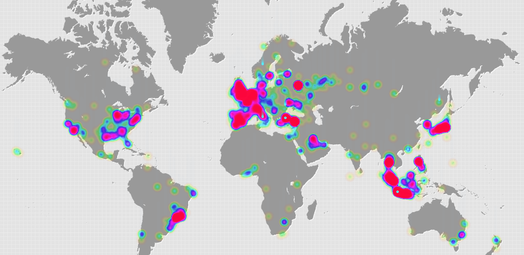> Je zou je kunnen afvragen of het goed is om geld te investeren in b.v. Facebook; als adverteerder of als content producent. Een 'gebruiker' van Facebook is eerder een 'gebruiker' zoals bedoeld in "gebruiker van heroïne" dan een gebruiker zoals in "gebruiker van biologisch afbreekbaar afwasmiddel". Ga op zoek naar frissere nettere plekken om die gebruiker te treffen.
The internet was originally built to survive a nuclear attack on the US. By design it was a distributed network connecting many computers through different paths, making it resilient in the event of a disappearing connection or computer. In recent years, however, much of the web has become more and more centralised.
A centralised approach is easier to reason about. Everything is stored in the (conceptually) same database, accessible through a uniform query language. Think Google, think Facebook, think Disqus. All offer a single sign-on mechanism into their ecosystem which allows users to react on stories, both within their apps, as well as outside in places when other proprietors have included a bit of the Google/Facebook/Disqus/… code. But in the end all the data is stored in a central store, not owned by that user, not owned by the owner of that blog, but owned by a large company that stores information for million's of other sites. C…
I had a few projects that I thought could use some share 'buttons', but I didn't like to include the JavaScript loaded and privacy invading share buttons that the networks try to sell you by default. Neither did I like to concatenate the links with all variables required for each project… so I wrote a small rubygem on a back and forth train trip (#ilovetrains ;)): social_linker.
The idea is that you share something about a certain subject, hence you initalize the SocialLinker::Subject and then you'll be able to generate share links from it:
subject.share_link(:facebook)
How it works
Initialize the subject with enough material to generate links from, such as the page's url, maybe the media url (mainly for Pinterest type-shares), a description, tags etc.
For example, initialize the SocialLinker::Subject as follows:
social_linker_subject = SocialLinker::Subject...
Het vinden van een publiek is lastig. In het bijzonder wanneer je zelf bepaalde standaarden stelt aan hoe dingen gedaan zouden moeten. Of bepaalde ideeën hebt over waar het zou moeten komen te staan. Zo kun je wel heel graag heel veel willen gaan zeggen op radio 6 omdat je dat zo’n gave zender vind, maar als zelfs je vrienden er niet naar luisteren… dan wordt je niet gehoord. Er zijn twee oplossingen. Ergens anders gaan uitzenden, of je uitzending ook op andere manieren aanbieden. En dat ga ik nu ook maar doen. Niet dat ik in de verste het bereik heb van een radio 6 programma maker… het is veel erger gesteld met mij. Ik haat Facebook. Toch ben ik er. Het doet zeer.
Today I was listening to a talk by @MarcdeVries,
CEO of Hyves RTV Oost, a local radio/television broadcaster. Hyves is the most popular social network in The Netherlands.
The points made by Marc de Vries were sensible, he knew what he was talking about. To be successful as a brand, whether you're a person or a corporation, you'll need to be authentic, compassionate, social, constructive and transparent. I know that is true, that's how you build quality relationships, essential for social relationships.
As you may now, I'm not really active in social networks (although my background suggests otherwise), I'm not really engaging. It doesn't really align with my personality which is more laid back, we'll see,  favouring quality relationships over superficial ones.
The talk got me thinking about differend kinds of webs, the one about social interactions and the one about practical information. One connecting unstructured data vs linking people. My primary focus is often…
